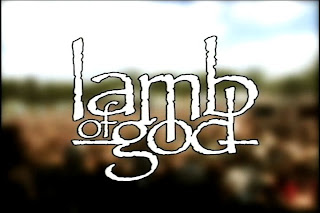
Lamb of God began as a primitive instrumental outfit called Burn the Priest. The name carried unwanted (and inappropriate) connotations for a group inspired by ‘80s thrash; due to its history, Lamb was banned last year from playing at a Los Angeles venue owned by a church. Blythe joined up for a series of 7”s and an eponymous album, after which Lamb of God adopted its present name. Over New American Gospel, As the Palace Burns, and Ashes of the Wake, the band honed its songwriting, with increasingly better production. The latter album was Lamb of God’s breakthrough, with major label promotion and high-profile tours on Ozzfest and Sounds of the Underground.
Sacrament has the band’s most memorable songs to date. Musically, there’s no fat. The band plays with laser precision and songs move smoothly through riffs and transitions. Blythe has expanded his range; along with his trademark midrange rasp, he also unleashes higher shrieks and lower growls, both of which drive “Requiem.” The guitar work is also more advanced. Lamb of God has never been known for solos, and while this album won’t change that, the leads are tasteful and more prominent than before. The real progress is in the rhythm parts, which feature plenty of wrist-straining string-skipping. Back in the day, the best way to learn metal rhythm guitar was from Metallica albums. Now, Lamb of God albums should do; “Pathetic” is practically a textbook in rhythm guitar techniques. The star here, though, is Adler. His crisp, pitched-up snare is a Lamb of God signature, and his snare downbeats recall John Tempesta on Testament’s Low. With rich fills, kinetic rolls, and insistent rides, Adler is one of the most identifiable drummers in metal.
The production is also distinctive: the mix is technically flawless, with great separation between instruments. But there’s simply too much. Blythe’s vocals too often come with dramatic reverb and layers of overdubs. The repeating industrial noise at the end of “Walk with Me in Hell” is cool, but distracting. Did the guitars in “Descending” need to enter via a techno-esque low-pass filter? The huge reverb on the snare at the end of “Pathetic” is ridiculous. It’s disconcerting to hear such a visceral band swathed in so much production. Pair these guys with Rick “No Reverb” Rubin, and the results would be deadly.

No comments:
Post a Comment